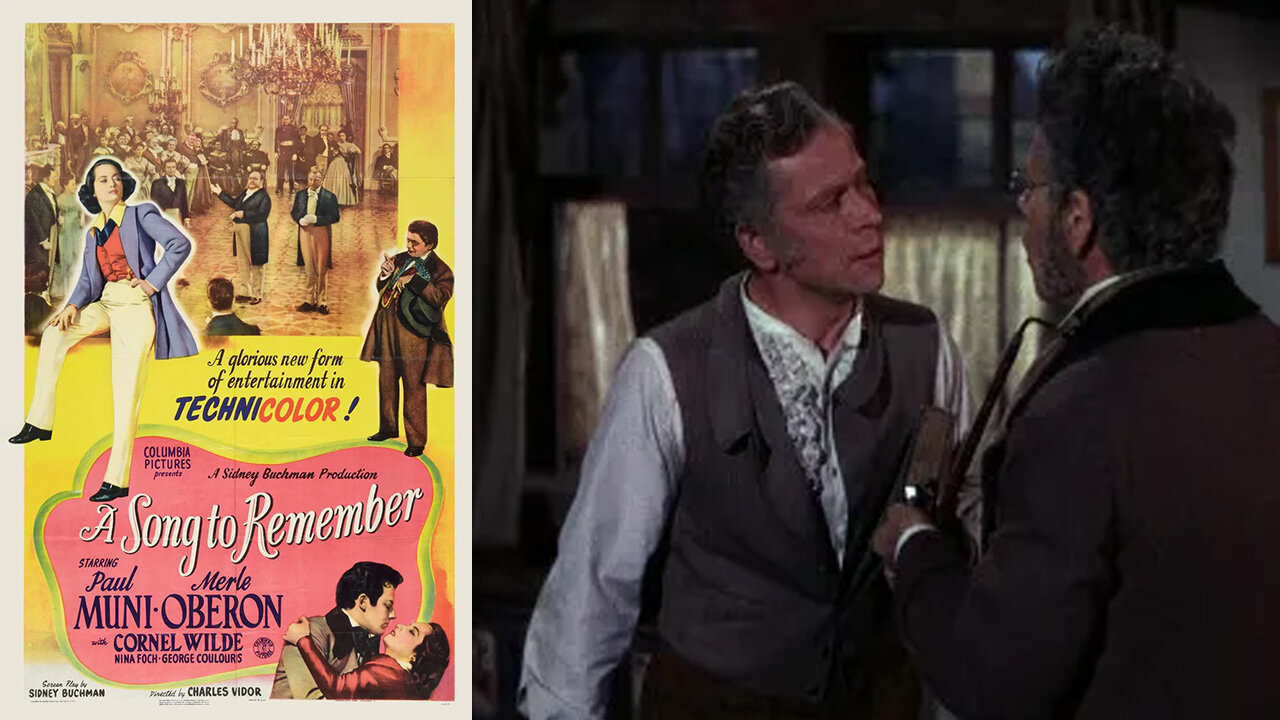Premium Only Content

'A Song To Remember' (1945) The Movie Ayn Rand Hated Most
'A Song to Remember', directed by Charles Vidor, is a Technicolor biopic of the legendary Polish composer Frédéric Chopin, with Cornel Wilde in the lead and Merle Oberon playing the seductive novelist George Sand. On its surface, the film is a lavish, sweeping tribute to artistic genius and tragic sacrifice. The musical sequences, rendered through the virtuoso hands of pianist José Iturbi (though uncredited), intoxicated 1940s audiences with high-culture pageantry. It was a commercial success and earned six Academy Award nominations. Yet beneath its glossy exterior lies a heavily fictionalized, morally didactic narrative that champions emotionalism and martyrdom — precisely the kind of ideology that Ayn Rand spent her career denouncing.
Romantic Melodrama Over Rational Biography: The film portrays Chopin as a delicate, sickly idealist torn between his musical vocation, patriotic duty, and tumultuous romance with Sand. The narrative arc is not one of volition and achievement, but one of self-denial and slow demise — a man who sacrifices his health and happiness for a cause and a woman. The patriotic theme, wherein Chopin becomes a symbol of Polish nationalism and is cajoled into using his music as a political tool, overtakes the individualist impulse that Rand would argue is central to genuine artistry.
Rand, whose philosophical worldview is defined by Objectivism — the belief in rational self-interest, individualism, and the moral rightness of pursuing one’s personal happiness — would have found this portrayal contemptible. Chopin, as presented in 'A Song to Remember', becomes the embodiment of the altruist ideal: he suffers for others, he submits to the expectations of society, and ultimately perishes not because of inner weakness but because of the nobility of sacrifice. In Rand’s moral universe, this is not noble but depraved.
Art as Propaganda — A Betrayal of the Artist: A crucial conflict in the film is Chopin’s reluctant agreement to embed patriotic messages in his performances, effectively turning his concerts into tools of political resistance against Russian occupation. Rand, who viewed the artist as an end in himself, would have bristled at this reduction of art to propaganda. To her, the function of art is not to serve the collective, nor to become a vehicle for political expression, but to project the artist’s vision of man and existence. The film’s depiction of Chopin subordinating his art to a cause — and being celebrated for it — would have confirmed for Rand that modern culture not only misunderstands art but actively corrupts it.
This echoes her argument in The Romantic Manifesto (1969), where she rails against the perversion of art for collectivist or mystical ends: “Art is the technology of the soul. It does not ‘serve’ society. It is not a sermon or a political speech. Its function is not to teach or preach but to show.” For Rand, to show Chopin not as a sovereign creator but as a passive vessel for nationalistic fervor was to destroy him as an artist in the eyes of philosophy.
George Sand: Femme Fatale as Corruptor: Merle Oberon's portrayal of George Sand further problematizes the narrative from a Randian lens. In the film, Sand is shown as a manipulative, self-absorbed woman who seduces Chopin, dominates him emotionally, and ultimately contributes to his physical and creative decline. Sand is the embodiment of second-handedness — she exploits Chopin's genius for her social and literary ambitions. The film’s message is not that Chopin should resist her influence and assert himself, but rather that he is tragically doomed to fall under her spell. The tragic framing of this relationship removes moral agency from Chopin, casting him as a victim — a cardinal sin in Rand’s moral vocabulary.
Rand detested victimhood as a moral ideal. In 'Atlas Shrugged' (1957), she offers a galaxy of heroes — John Galt, Hank Rearden, Dagny Taggart — who never relinquish their independence or moral clarity to parasites or manipulators. Chopin’s passive collapse under Sand’s influence, presented as pitiable and noble, would have disgusted her. She may well have viewed 'A Song to Remember' as a parable not about artistic triumph, but about the destruction of greatness by mediocrity and the celebration of that destruction as romantic.
Sentimentality as Moral Poison: Perhaps most fundamentally, A Song to Remember is drenched in a kind of sentimental aesthetic that Rand found repugnant. The film’s tone is melodramatic, tearful, almost sanctimonious in its reverence for Chopin’s pain. Suffering becomes the badge of moral worth. His early death is not portrayed as a preventable tragedy or a consequence of bad choices, but as the beautiful culmination of a life lived for others.
Rand, by contrast, saw suffering as a sign of failure, not heroism. “Man is an end in himself,” she writes in For the New Intellectual (1961), “not a means to the ends of others.” To glorify self-sacrifice — especially when it leads to artistic silence and death — is to enshrine death over life. 'A Song to Remember' is soaked in the Christian-tinged ethic of redemptive agony. Rand, an atheist and rationalist, would have recognized this not as virtue, but as a philosophical fraud.
Conclusion: A Song to Forget: While 'A Song to Remember' remains a visually sumptuous, emotionally affecting film, its core message is one that Ayn Rand would have denounced: the sanctification of self-sacrifice, the subordination of art to politics, and the transformation of a brilliant individual into a martyr for causes not his own. In Rand’s view, this is not only bad art, but bad morality — a philosophical inversion where weakness is strength, death is virtue, and the artist is not a creator but a servant.
Rand hated 'A Song to Remember' not because it was technically poor or dramatically ineffective, but because it was philosophically poisonous. It dramatized everything she opposed: altruism, collectivism, mysticism, and the glorification of the “noble sufferer.” For her, the proper depiction of a genius like Chopin would have shown him fighting to assert his values, his music, and his life — not laying them down in the name of sacrifice. The film’s final notes, therefore, are not an anthem of remembrance, but a requiem for the greatness it fails to understand.
-
 LIVE
LIVE
The Bubba Army
2 days agoMichigan Church Attack, 4 DEAD 8 WOUNDED - Bubba the Love Sponge® Show | 9/29/25
7,558 watching -
 18:09
18:09
Forrest Galante
9 hours agoI Survived 24 Hours In The World's Deadliest Jungle
25.5K10 -
 25:31
25:31
MattMorseTV
14 hours ago $24.29 earned🔴We just got THE MOTIVE.🔴
29.8K167 -
 15:49
15:49
Nikko Ortiz
19 hours agoI Have A Gun
21.6K17 -
 15:51
15:51
GritsGG
16 hours agoWinning a Warzone Match From a Tree! #1 Player's POV!
10K1 -
 2:31:01
2:31:01
The Connect: With Johnny Mitchell
1 day ago $38.53 earned"It's About To Get Worse"- CIA Agent Andrew Bustamante Explains Why It's Time To Leave America
47.8K80 -
 16:21
16:21
The Pascal Show
1 day ago $2.44 earned'THE FEDS MADE THIS UP!' Candace Owens Drops BOMBSHELL Pushing Back On Details In Charlie Kirk Case
9.94K18 -
 LIVE
LIVE
Lofi Girl
2 years agoSynthwave Radio 🌌 - beats to chill/game to
299 watching -
 25:39
25:39
DeVory Darkins
14 hours ago $21.63 earnedMass shooting erupts in Michigan as bombshell study shows left wing political violence skyrocketed
43.2K130 -
 5:55:33
5:55:33
MattMorseTV
13 hours ago $131.22 earned🔴Portland ANTIFA vs. ICE.🔴
184K374